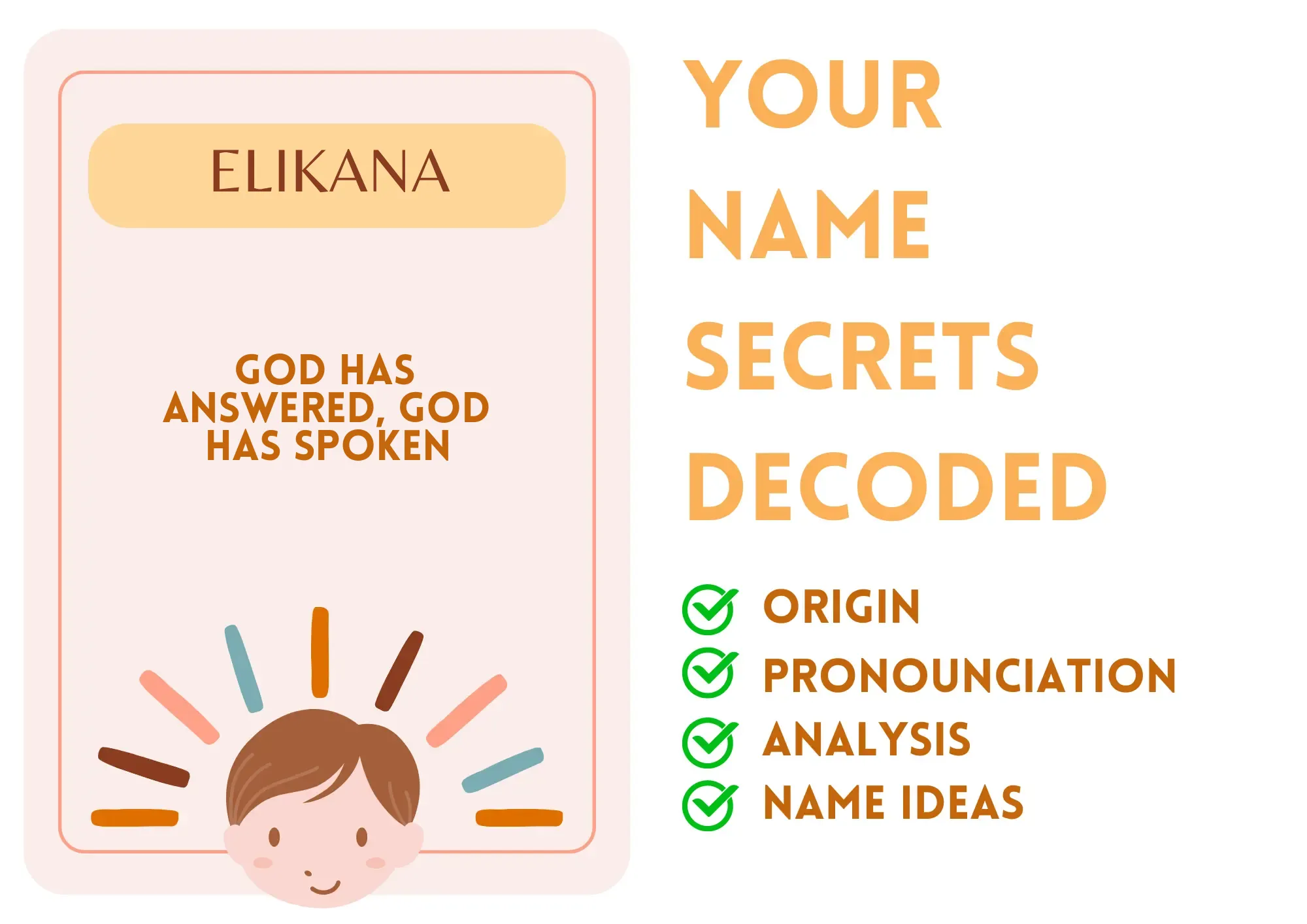
Elikana
Elikana is a beautiful name rooted in Hebrew culture, meaning ‘God has answered’ or ‘God has spoken’. This name is predominantly used in Jewish communities and carries significant spiritual weight. It is typically given to boys, but it can also be used as a unisex name in some modern interpretations.
Historically, Elikana embodies themes of answered prayers and divine communication, making it a meaningful choice for families seeking a name with deep religious significance. In scriptural contexts, it correlates to themes of hope and gratitude towards divine intervention.
In popular culture, the name Elikana does not have widely known literary or cinematic references but resonates within certain Jewish texts and personal narratives, embodying a message of connection to faith and spirituality. Overall, people often perceive Elikana positively due to its unique sound and profound meaning.
Basic Information
Gender: Boy
Sounds Like: Eh-lih-kah-nah
Pronunciation Explanation: The first syllable 'Eh' is pronounced like 'elephant', the second 'lih' as in 'lit', followed by 'kah' like 'car', and ending with 'nah' as in 'banana'.
Summary and Meaning
Meaning: God has answered, God has spoken
Origin: The name Elikana has Hebrew origins, stemming from the elements 'Eli' meaning 'my God' and 'Kana' meaning 'to be zealous'.
Usage: Traditionally, Elikana is a masculine name; however, it is being adopted as a unisex name by some modern families.
Name Number (Chaldean)
Name Number (Pythagorean)
Popularity (Global Rank)
Overall: 125546
Boys:
Most Popular in
Religious and Cultural Significance
Religion: Judaism
Background: In Jewish culture, Elikana holds significance as a name reflecting divine communication and answered prayers, symbolizing a strong relationship with God.
Cultural Significance: Elikana is often chosen for boys born during moments of divine significance or hope, emphasizing gratitude for answered prayers.
Historical Significance: The name has biblical roots, connecting it to notable figures, such as Elkanah, who is mentioned in the Books of Samuel in the Old Testament, known for his role as a devoted husband and father.
Popular Culture
Literature and Mythology: While not widely referenced in contemporary literature, Elikana may appear in personal narratives or spiritual writings conveying themes of faith.
Movies and Television: Currently, Elikana does not have significant presence in mainstream media, although it may be featured in less prominent independent films or stories centered around Jewish themes.
Feelings and Perceptions
Perception: Elikana is viewed favorably, often associated with uniqueness and spirituality.
Positive Feelings: Meaningful, spiritual, hopeful, divine, connected to faith.
Negative Feelings: Some may find it uncommon or difficult to pronounce correctly at first.
Practical Considerations
Ease of Writing and Calling: Elikana is moderately easy to write and pronounce, containing seven letters and four syllables, which can be a tongue twister for some but is memorable.
Common Typos and Misspellings: Elikana,Elykana,Elikanna,Elicana
Common Nicknames: Eli,Kana,Kani
Elikana Popularity
Elikana Usage and Popularity By Country
| Country | Rank (Overall) |
|---|---|
| Tanzania | 855 |
| Namibia | 3816 |
| Uganda | 20326 |
| Belgium | 48129 |
| Canada | 96992 |
| Australia | 105589 |
| United Kingdom | 182431 |
| United States | 344452 |
| India | 378646 |
Elikana Usage and Popularity By City
| City | Rank (Overall) |
|---|---|
| Winnipeg | 5013 |
Compatibility Analysis
Famous Persons Named Elikana
No results found for Elikana.
Related Names
Similar Sounding Names:
Eliana,Elina,Eliana